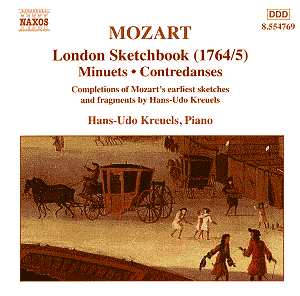I donít know if you have the same reaction as
I do when you hear a composer "squandering" a good tune.
Iím sure you know what I mean Ė when a brilliant or gorgeous tune
is introduced only to vanish as quickly as it appeared, never
to be developed, just spiralling away into a musical "black
hole". At best I feel sad when that happens and at other
times I get angry that the composer should tantalise me like that,
and itís at those times when I wish I could write music so that
I could develop such tunes as are "cast-offs" by those
that can.
Well if you do feel this way then Iíd advise
you to avoid this disc as it will be sheer purgatory for you!
It is further proof (as if it were needed!) of how much of a genius
Mozart was. These works were composed entirely by him (without
the aid of his father who had touched up various of his very first
efforts) during his 15 month stay in London at the age of 8 whilst
on a 3Ĺ year grand tour of Europe. Comprising 39 "works"
these drafts and fragments show the incredible inventiveness the
fledgling composer possessed. By the time the sketchbook was finished
Wolfgang Amadeus had already completed several symphonies. I wonder
whether any of these musical ideas make their appearance in any
of them.
Whilst in London Mozart made the acquaintance
of Johann Christian Bach, whose music had a deep influence on
the young boy. He made much progress during this period in which
he and his sister performed in front of the King and his family
as well as to Londonís smart set. Indeed his father Leopold wrote
that "my boy knows in this his eighth year what one would
expect only from a man of forty".
Hans-Udo Kreuels, pianist, composer and teacher,
has spent two decades working on this material and has performed
an invaluable task in helping us to widen our view of Mozart and
rescuing what would otherwise have remained a closed book to most
music-lovers.
Professor Kreuels writes in the informative insert
that he has completed and realised these works for the keyboard
since it is that which exerted the greatest influence on them.
However he does feel that some of these pieces were written for
other instruments. He also writes that to complete this labour
of love required "an intuitive feel for the limited attention
span and sudden Ďmicroí impulses characteristic of the young child".
Those of us who are parents can understand what heís getting at,
though most of us have experienced the limited attention span
of our children only in relation to games or reading or other
"normal" pastimes in which they showed only transient
interest. How extraordinary it must have been to watch your young
son compose such works as these knowing for the most part that
they were simply created to prevent boredom from taking hold.
Many were apparently written at a time when his father was ill
and he and his sister were forbidden to play the harpsichord.
This disc is a fascinating yet frustrating glimpse
at Mozartís unique gift. This gift enabled him to create wondrous
things at any moment he pleased. He didnít feel the need to complete
these things because he knew he could conjure up others just as
easily. A delightful disc nevertheless, that is sympathetically
played with obvious affection for both the composer and the works.
Steve Arloff
